Iranians To Hold Another Global Protest Rally On October 29
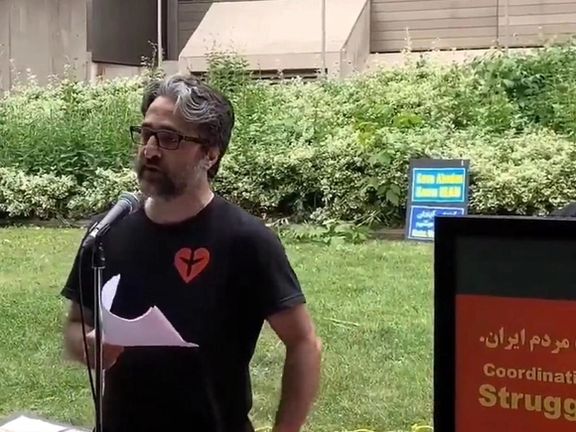
Canada-based activist Hamed Esmaeilion has called for unity among all the groups and peoples protesting against the Islamic Republic, noting that all Iranians face a common enemy.

Canada-based activist Hamed Esmaeilion has called for unity among all the groups and peoples protesting against the Islamic Republic, noting that all Iranians face a common enemy.
Esmaeilion, who lost his daughter and wife in the shooting down of a Ukrainian passenger plane in January 2020 by the Revolutionary Guard, said in a statement on Thursday that "When all ethnic groups stand together in front of a common enemy, Iran is the main issue."
Urging all Iranians to participate in the worldwide protest rallies scheduled for October 29, he said that "Don't forget that the Islamic Republic is the main killer, assassin and oppressor.”
Tens of thousands of Iranians, estimated to be over 100,000 people, took to the streets in the German capital Berlin to support their fellow-countrymen struggling against government brutality.
Protesters carried the pictures of Mahsa Amini, the 22-year-old woman who was killed in the custody of Iran’s ‘morality police’, as well as those who lost their lives in the nationwide protest movement since mid-September. They also unfurled a large Iranian pre-revolution national flag, which has become a symbol of rejecting the Islamic Republic.
Addressing the rally Berlin, Esmaeilion said, “We have a dream which will be realized with the fall of Khamenei's empire of fear and crime. In this dream, wind will blow through women's hair, and no one will attack schoolgirls.”
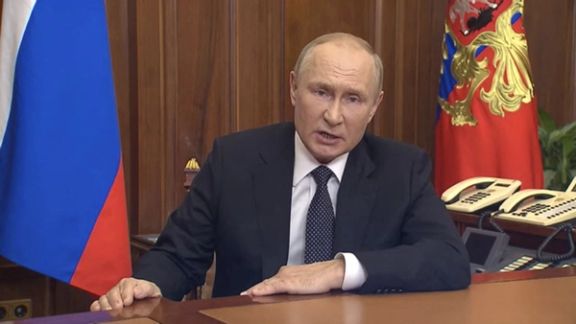
Following the Wednesday attack on a shrine in Shiraz, Russian President Vladimir Putin has expressed Moscow's readiness for further cooperation with Tehran on ‘counter-terrorism issues.’
Putin sent his condolences to his Iranian counterpart Ebrahim Raisi in connection with the terrorist attack in Shiraz in a message published on Thursday on the Kremlin website.
"Please accept my sincere condolences on the tragic consequences of the terrorist act in Shiraz. It is hard to imagine a more cynical crime than the killing of civilians, including children and women, inside the walls of a religious shrine. We have once again seen that terrorism violates not only laws but also human morals," Putin said.
Putin’s vows for support against terrorist activities in Iran can be construed as a greenlight to support the Islamic Republic in its crackdown on the antigovernment protests that have engulfed the country since the death in custody of 22-year-old Mahsa Amini.
In addition to Iranian authorities such as the Supreme Leader and President Ebrahim Raisi, several other supporters of the regime in Tehran are trying to link the terrorist attack to the ongoing protests but many Iranians are not convinced the regime had no part in it, saying it is a scenario for cracking down harder on protesters.
Earlier in the day, the secretary general of Iran-backed Lebanese group Hezbollah said those fanning the flames of recent riots in the Islamic Republic are responsible for the horrendous attack that killed at least 15 people.
On Thursday, the White House also expressed concerns that Russia may be advising Tehran on best practices to suppress the ongoing protests in Iran.
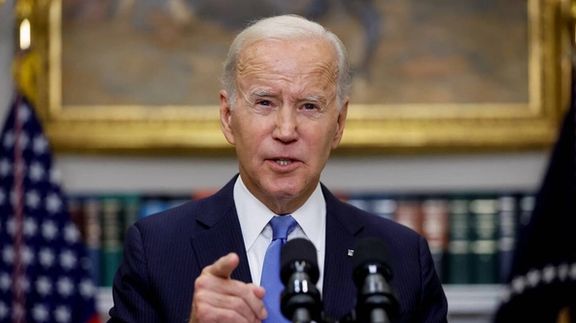
The US State Department Wednesday refused to characterize the demand of Iranian protesters as regime change after days of controversy and campaigns by activists.
On October 23, US Special envoy for Iran Rob Malley sent out a tweet that became a source of controversy and triggered a strong backlash from Iranian-Americans and others. Malley wrote that protesters in Iran wanted “their government” to respect them and safeguard human rights, while clearly, they simply reject the Islamic Republic and want a secular, democratic government.
Iranian activists began an online campaign against Malley, even demanding his resignation.
Malley on Monday admitted that his choice of words was wrong, in an interview with Iran International, and the new line from the State Department became, “We cannot speak on behalf of Iranian protesters.”
Reporters on Wednesday asked the deputy spokesperson Vedant Patel again how the US would characterize the demands of the protesters, or what is the US government’s understanding about their demands.
Patel, again avoided an answer, saying that no one in the US government “should claim or can claim to speak for these protesters; only they can do that. And we, our role is to continue to take steps and take practical efforts to use the tools at our disposal to hold the regime accountable for what we are seeing happen across Iran.”
But pressed further, Patel did begin to characterize the aspiration of the Iranian protesters. “What we are seeing is the Iranian people demand basic human rights, rights of expression, as this started in the death of Mahsa Amini, and we’re seeing the Iranian people make their voices heard. But I don’t have any other specific assessment to offer.”
Saying that the Iranian people want “basic human rights” is not much different from what Rob Malley said a few days earlier.

Meanwhile, Iranian activist and women’s rights advocate Masih Alinejad has launched an online petition demanding Malley’s resignation that has collected nearly 100,000 signatures.
Tehran has been claiming from the start of the protests that the United States and “other enemies” are behind the unrest, because Iran has become “too powerful,” as President Ebrahim Raisi said this week, and they want to weaken it.
It is not clear if the Biden Administration is concerned that if it speaks about the real demand of the protesters, it might help Iran’s unsubstantiated claims, or it is just loath to uttering ‘regime change’, a term more popular with the former Trump administration.
Former President Donald Trump who pulled the United States out of the Obama-era nuclear deal with Iran imposed ‘maximum pressure’ sanctions on Tehran and his administration officials had no qualms about calling the clerical regime the main cause of trouble in the region.
Otherwise, the White House has been outspoken about the need to condemn the Islamic Republic for its violent crackdown on unarmed protesters. The administration has imposed sanctions on a series of Iranian officials and also adopted a tough position against Iranian drone deliveries to Russia that have terrorized Ukrainian civilians.
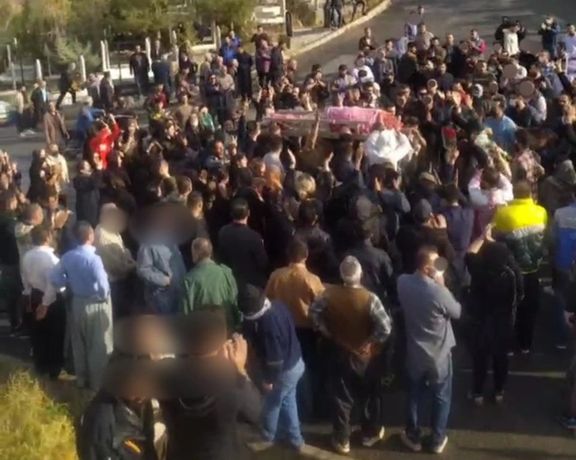
Large crowds that took to the streets in the Kurdish city of Mahabad in northwestern West Azarbijan Province Thursday morning have reportedly taken control of the governorate and some other buildings.
Residents of Mahabad took to the streets after participating in the funeral ceremony of 35-year-old Esmail Moloudi who was killed during nationwide protests the night before after security forces opened fire at the chanting crowd to disperse them.
Participant in Moloudi’s funeral chanted anti-government slogans such as “Death to the Dictator” and “A martyr does not die”.
Videos posted on social media show a huge crowd of protesters on the street and protesters outside the governorate building part of which was burning. Videos also show security forces shooting at protesters and some injured protesters.
Moloudi, father of one, was shot dead Wednesday night duringprotests in Mahabad.
Protests were held in over thirty cities and towns across the country on Wednesday to honor Mahsa Amini whose death in custody sparked the current protests on the traditionally significant 40th day of her death.
According to Hengaw Organization for Human Rights another 21-year-old man named Mohammad Shariati was also killed in Sanandaj by security forces’ direct fire Wednesday evening.
Iran Human Rights, a Norway-based rights organization, said Tuesday that at least 234 people, including 29 children have been killed in the ongoing nationwide protests in Iran.
The protests which erupted in Mahsa Amini’s hometown of Saqqez and the capital Tehran after her death in hospital soon spread to many other towns and cities across the country. Protests in Iran have garnered massive support from expatriate communities around the world as well as foreign governments and officials.
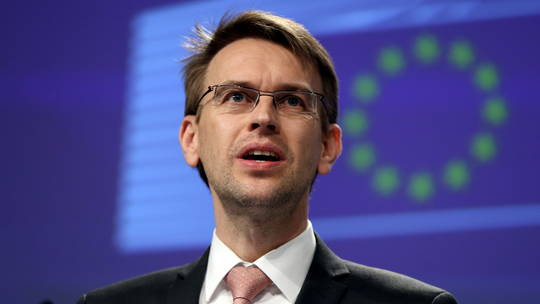
The European Union on Thursday dismissed sanctions that the Islamic Republic imposed on several EU individuals and media outlets in a tit-for-tat move as "purely politically motivated."
Expressing concerns about the clerical regime's ongoing violent crackdown on antigovernment protests, EU’s lead spokesperson for foreign affairs Peter Stano told journalists Thursday that contrary to Tehran’s sanctions, “when you take the EU sanctions (on Iran), they are adopted on clear legal grounds, based on the evidence of human rights violations in Iran."
In reaction to the EU’s October 17 sanctions targeting Iranian individuals and entities over their role in the brutal suppression of peaceful protests,Tehran announced Wednesday sanctions against eight institutions and 12 individuals based in the EU.
Iran’s Foreign Ministry claimed that the Islamic Republic’s sanctions were imposed due to “deliberate actions in support of terrorism and terrorist groups, encouraging and inciting terrorism, violence, and hatred, which has caused riots, violence, terrorist acts, and human rights violations against the people of Iran.”
Iranian authorities, including the Supreme leader and the president, accuse Western countries and Israel of being behind the current wave of antigovernment protests, ignited by the death in custody of 22-year-old Mahsa Amini.
The new list of sanctions includes the Persian-language services of Germany’s Deutsche Welle and France’s RFI, extending Iran’s animosity against foreign-based channels that it says are promoting an uprising such as BBC Persian and Iran International. Two directors of the German newspaper Bild were also blacklisted.
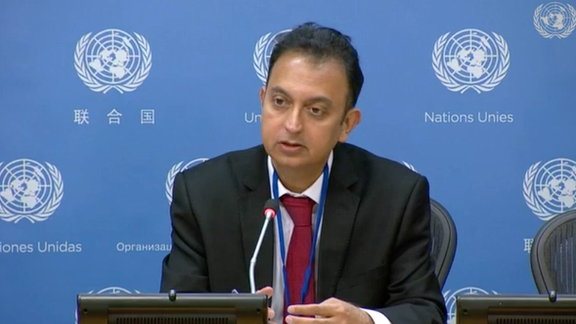
The UN Special Rapporteur on the Human Rights Situation in Iran has called for prompt establishment of investigative mechanism into human rights violations in Iran.
In a statement on Wednesday, Javaid Rehman said current investigations and domestic accountability channels had failed to meet the minimum standards of transparency, objectivity and impartiality, urgingan independent mechanism into all human rights violations leading up to and since the death of Jina Mahsa Amini, who died in hospital after being arrested by the morality police.
He said that the Islamic Republic is monitoring, harassing, and sometimes beating women on a daily basis in the pretext of its mandatory dress code -- implemented through the morality police.“This is meant to instill an atmosphere of fear,” he noted.
“Chronic impunity and lack of redress for previous violations have culminated in today’s events as we see protests throughout the country calling for justice and accountability for Amini’s death but also demanding respect for fundamental socio-economic and political rights and particularly freedom of expression,” he added.
Also on Wednesday, a group of UN human rights experts condemned the killings and the crackdown by security forces in Iran on protesters, including alleged arbitrary arrests and detentions, gender-based and sexual violence, excessive use of force, torture, and enforced disappearances.
They also urged that the reports be thoroughly and independently investigated and those responsible held to account, adding, “An alarming number of protesters have already been detained and killed, many of whom are children, women and older persons. The Government must instruct police to immediately cease any use of excessive and lethal force and exercise restraint.”